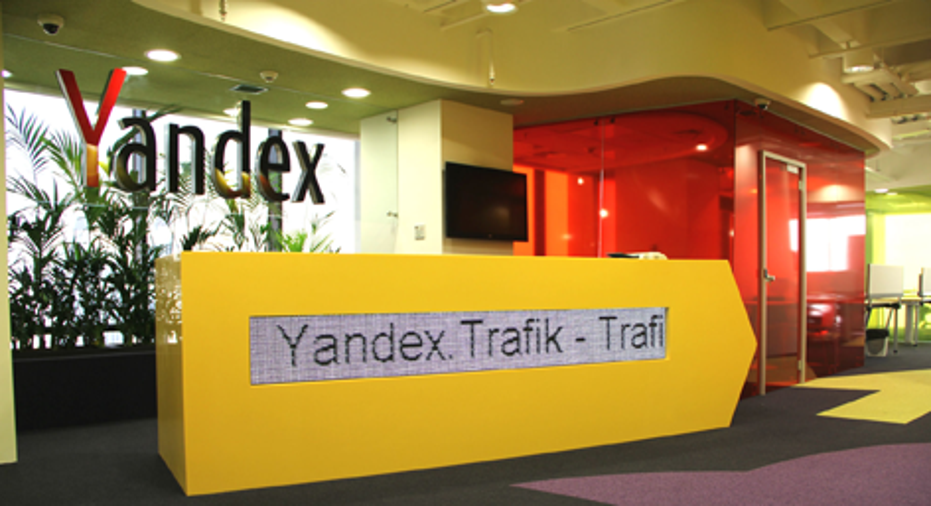Yandex Gains Share on Android in Another Decent Quarter

Image source: Yandex N.V.
Yandex N.V.(NASDAQ: YNDX)reported second-quarter 2016 results on July 28. And though shares initially jumped as Yandex exceeded expectations for the third consecutive quarter, they've since pulled back as the market digested the Russian internet search leader's latestreport.
Let's take a closer look at how Yandex capped the first half of the year.
Yandex results: The raw numbers
|
Q2 2016 Actual |
Q2 2015 Actual |
Growth (YOY) |
|
|---|---|---|---|
|
Revenue |
18.04 billion RUR |
13.92 billion RUR |
29.6% |
|
Adjusted net income |
3.91 billion RUR |
2.79 billion RUR |
39.9% |
|
Adjusted EPS (diluted) |
11.96 RUR |
8.62 RUR |
40.5% |
*Figures in Russian rubles. Data source: Yandex N.V. YOY = year over year.
What happened with Yandex this quarter?
- Revenue excluding traffic acquisition costs -- which Yandex compares to sales commissions -- grew 33% year over year, to 14.49 billion RUR.
- Adjusted EBITDA increased 40% year over year, to 6.76 billion RUR.
- Shares of the Russian search market (including mobile) averaged 57% during the quarter, down from 57.6% last quarter, which management says was driven by a combination of seasonality, "limitation of our distribution activities in Google Chrome," and a decline in share of overall iOS devices.
- It gained 200 basis points of market share on Android as new smartphone models with Yandex services pre-installed became available in retail stores.
- Top-line gains were again broad-based, including:
- 26% growth in search and portal revenue, to 13.11 billion RUR.
- 46% growth in e-commerce revenue, to 1.07 billion RUR.
- 172% growth in taxi revenue, to 528 million RUR.
- 48% growth in classifieds revenue, to 211 million RUR.
- 63% growth in "experiments" revenue, to 153 million RUR, including KinoPoisk, Yandex.Music, Yandex.Radio, Yandex.Tickets, Yandex.Afisha, and Yandex TV.
- Search queries in Russia increased 7% year over year.
- Total advertising revenue increased 28% year over year, to 17.3 billion RUR, representing 96% of total revenue. Within that:
- Revenue from Yandex websites increased 24%, to comprise 70% of total revenue.
- Revenue from ad network partners rose 37%, to comprise 26% of total revenue.
- Aggregate paid clicks grew 13% year over year.
- Average cost per click increased 14% year over year.
- "Other" revenue rose 106% to 641 million RUR, primarily driven by Yandex.Taxi.
- There were no significant updates to Yandex's antitrust complaint against Google following the favorable Federal Anti-Monopoly Service ruling last quarter. As it stands, the next hearing in the case is scheduled for August 16, 2016, and Yandex continues to expect the case to be resolved by the end of the year.
What management had to say
Yandex CEO Arkady Volozh stated:
Yandex COO Alexander Shulgin added:
Looking forward
Based on Yandex's strong first-half results, the company increased its full-year guidance and now expects 2016 revenue to grow 19% to 22% over 2015. By comparison, last quarter, Yandex increased its guidance to call for 2016 revenue growth in the range of 15% to 19%.
All things considered, this was another solid quarter from Yandex with continued broad growth across its various business segments. But in the end, while Yandex's top and bottom lines are still moving in the right direction,we should also keep a close eye on Yandex's overall market share as it continues to battle Google in the courtroom.
A secret billion-dollar stock opportunity The world's biggest tech company forgot to show you something, but a few Wall Street analysts and the Fool didn't miss a beat: There's a small company that's powering their brand-new gadgets and the coming revolution in technology. And we think its stock price has nearly unlimited room to run for early, in-the-know investors! To be one of them, just click here.
Steve Symington has no position in any stocks mentioned. The Motley Fool recommends Yandex. Try any of our Foolish newsletter services free for 30 days. We Fools may not all hold the same opinions, but we all believe that considering a diverse range of insights makes us better investors. The Motley Fool has a disclosure policy.



















